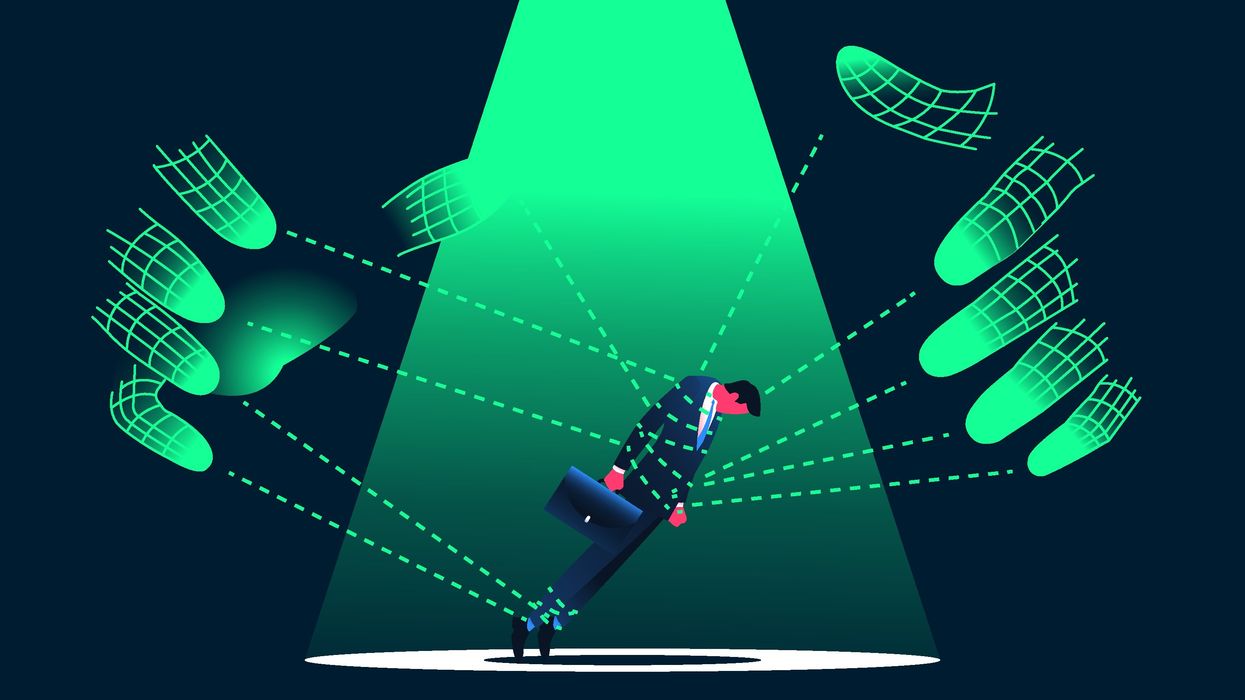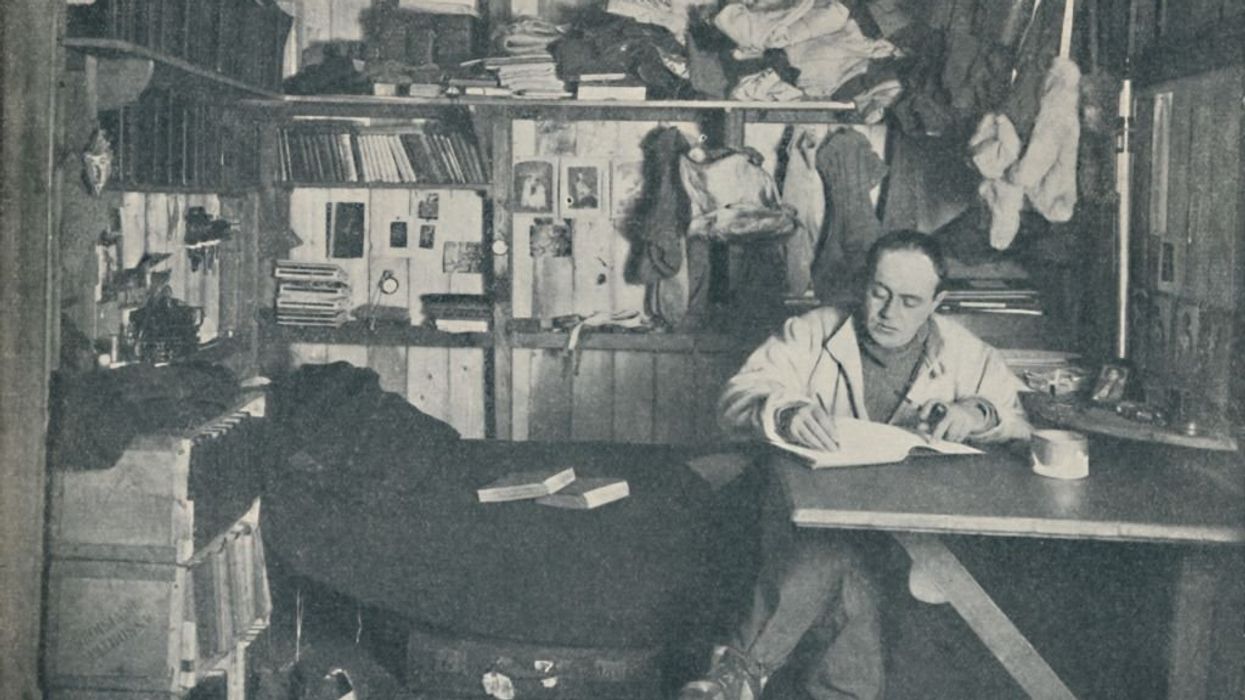
© 2024 Blaze Media LLC. All rights reserved.
"Even if you think you're keeping your information private, we can learn a lot about you."
- A new study is revealing how something as simple as clicking "like" on Facebook can reveal personal information with 80 percent accuracy.
- Researchers found clicking like could identify a person's sexual orientation, gender, age, race, IQ and more.
- Some information derived from likes seem to make sense while others, liking curly fries being associated with a higher IQ, for example, are more confusing.
- Liking "Glenn Beck" correlated with people being "satisfied with life."
 A videographer shoots the side of Facebook's Like Button logo displayed at the entrance of the Facebook Headquarters in Menlo Park, California as Facebook becomes a publicly traded company after completing its initial public offering on May 18, 2012. (Photo: KIMIHIRO HOSHINO/AFP/Getty Images)
A videographer shoots the side of Facebook's Like Button logo displayed at the entrance of the Facebook Headquarters in Menlo Park, California as Facebook becomes a publicly traded company after completing its initial public offering on May 18, 2012. (Photo: KIMIHIRO HOSHINO/AFP/Getty Images)
LONDON (TheBlaze/AP) -- Maybe you've done your due diligence on Facebook, setting your privacy to as strict as possible to limit how much strangers can find out about you while still being able to enjoy the social media site. But did you know clicking those friendly blue "like" buttons strewn across the Web well beyond Facebook's main site may be doing more than marking you?
It could out you as gay.
It might reveal how you vote.
It might even suggest that you're an unmarried introvert with a high IQ and a weakness for nicotine.
That's the conclusion of a study published Monday in Proceedings of the National Academy of Sciences. Researchers reported analyzing the likes of more than 58,000 American Facebook users to make guesses about their personalities and behavior, and even whether they drank, smoked, or did drugs.
Cambridge University researcher David Stillwell, one of the study's authors, said the results may come as a surprise.
"Your likes may be saying more about you than you realize," he said.
Watch this report about the study:
Facebook launched its like button in 2009, and the small thumbs-up symbol has since become ubiquitous on the social network and common across the rest of the Web as well. Facebook said last year that roughly 2.7 billion new likes pour out onto the Internet every day - endorsing everything from pop stars to soda pop. That means an ever-expanding pool of data available to marketers, managers, and just about anyone else interested in users' inner lives, especially those who aren't careful about their privacy settings.
Many Facebook users might not realize that to adjust who can see what they "like" on Facebook means they need to physically go into the "likes" section on their profile and choose the audience they will allow to see likes in each category, which includes movies, books, music and more.
Who can see what you like (or comment on) with regard to posts? This was the answer to a similar question on Facebook's help center:
People included in the audience of the post can see your comment or like in News Feed or ticker as well as other places around Facebook. You can check who something is shared with by going to the post and hovering over the audience icon.For example, you might comment on a photo one of your family members posts to just family. A friend of yours, who isn't included in the audience the photo was shared with, won't see a story in ticker or News Feed about your comment.
If you aren't comfortable with who can see the post, don't like it or comment on it. Learn how to delete a comment or unlike something.
Stillwell and his colleagues for the study scooped up a bucketful of that data in the way that many advertisers do as well - through apps. Millions of Facebook users have surveyed their own personal traits using applications including a program called myPersonality. Stillwell, as owner of the app, has received revenue from it, but declined to say how much.
 (Image: YouAreWhatYouLike screenshot)
(Image: YouAreWhatYouLike screenshot)
His study zeroed in on the 58,466 U.S. test takers who had also volunteered access to their likes.
When researchers crunched the "like" data and compared their results to answers given in the personality test, patterns emerged in nearly every direction. Since the study involved people who volunteered access to their data, it's unclear if the trends would apply to all Facebook users.
The study found that Facebook likes were linked to sexual orientation, gender, age, ethnicity, IQ, religion, politics and cigarette, drug, or alcohol use. The likes also mapped to relationship status, number of Facebook friends, as well as half a dozen different personality traits.
Some likes were more revealing than others. Researchers could correctly distinguish between users who identified themselves as black or white 95 percent of the time. That success rate dropped to a still impressive 88 percent when trying to guess whether a male user was homosexual, and to 85 percent when telling Democrats from Republicans. Identifying drug users was far trickier - researchers got that right only 65 percent of the time, a result scientists generally describe as poor. Predicting whether a user was respectively a child of divorce was even dicier. With a 60 percent success rate, researchers were doing just slightly better than random guesses.
The linkages ranged from the self-evident to the surreal.
Men who liked TV song-and-dance sensation "Glee" were more likely to be gay. Men who liked professional wrestling were more likely to be straight.
Those who liked Glenn Beck were found to be "satisfied with life" and, as one might expect, identify as Republican.
Drinking game aficionados were generally more outgoing than, say, fans of fantasy novelist Terry Pratchett. People who preferred pop diva Jennifer Lopez usually gathered more Facebook friends than those who favored the heavy metal sound of Iron Maiden.
Among the more poignant insights was the apparent preoccupation of children of divorce with relationship issues. For example, those who expressed support for statements such as "Never Apologize For What You Feel It's Like Saying Sorry For Being Real" or "I'm The Type Of Girl Who Can Be So Hurt But Still Look At You & Smile" were slightly more likely to have seen their parents split before their 21st birthday.
Some of the patterns were difficult to understand: The link between curly fries and high IQ scores was particularly baffling.
Jennifer Golbeck, a University of Maryland computer scientist who wasn't involved in the study but has done similar work, endorsed its methodology, calling it smart and straightforward and describing its results as "awesome."
But she warned of what the work showed about privacy on Facebook.
"You may not want people to know your sexual orientation or may not want people to know about your drug use," she said. "Even if you think you're keeping your information private, we can learn a lot about you."
Facebook said the study fell in line with years of research and was not particularly surprising.
"The prediction of personal attributes based on publicly accessible information, such as ZIP codes, choice of profession, or even preferred music, has been explored in the past," Facebook's Frederic Wolens said in a written statement.
Wolens said that Facebook users could change the privacy settings on their likes to put them beyond the reach of researchers, advertisers or nearly anyone else. But he declined to say how many users did so.
For the unknown number of users whose preferences are public, Stillwell had this advice: Look before you like.
The like button is "quite a seductive thing," he said. "It's all around the Web, it's all around Facebook. And it's so easy."
Check out the study here or see a chart with some of the revealing likes here.
Want to leave a tip?
We answer to you. Help keep our content free of advertisers and big tech censorship by leaving a tip today.
Want to join the conversation?
Already a subscriber?
more stories
Sign up for the Blaze newsletter
By signing up, you agree to our Privacy Policy and Terms of Use, and agree to receive content that may sometimes include advertisements. You may opt out at any time.
© 2024 Blaze Media LLC. All rights reserved.
Get the stories that matter most delivered directly to your inbox.
By signing up, you agree to our Privacy Policy and Terms of Use, and agree to receive content that may sometimes include advertisements. You may opt out at any time.


